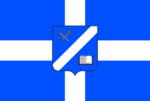President of Gerenia
| President of the Republic of Gerenia Brežagtör Resuyes Gherenie'es | ||

| ||
| Presidential Standard | ||

| ||
| Incumbent | ||
| Mikkel Anerat | ||
| since 22 July 2017 | ||
| Style | Misakiiĵ | |
| Residence | Notikkalves, Nevaya | |
| Appointer | Popular vote | |
| Term | Two years | |
| Inaugural holder | Gerald Ruze | |
| Formation | 2012 | |
The President of the Republic of Gerenia (Gerenian: Brežagtör Resuyes Gherenie'es) is the nation's head of state. Under the Gerenian constitution, executive power is vested in the president. The president is elected directly by the people of Gerenia for a term of two years. The current office-holder is Mikkel Anerat.
History
The Gerenian People had a long republican tradition at the time of settling in the continent of Apollonia, so the establishment of a presidential republic was expected. During the first years of the Republic of Gerenia, and especially before the Parliament was set up, the president had great powers. The Constitution was reformed in 2013 and 2014, to redistribute some powers to the Parliament and local authorities. Among these changes, the most notable are: presidential decrees must be approved by the Higher Assembly (the Parliament's higher chamber), and the President can no longer appoint Provincial Governors.
Election
- See also: Elections in Gerenia
Candidates for president can be nominated by registered parties which have received at least one seat in the preceding parliamentary election.
If only one candidate is nominated, he or she becomes president without an election. Otherwise, the first round of balloting takes place in March in the election year. The elections are two-staged. If one of the candidates receives more than half of the votes cast, he or she is elected president. If no candidate wins a majority in the first stage, the top two candidates rerun in the second stage three weeks later. The candidate who then receives more votes is elected.
Duties and powers
The president’s functions and powers are directly defined in the Constitution. In addition to those specified there, the president also discharges functions assigned to him or her in other laws. Under the Constitution of Gerenia, executive power is vested in the President and the Cabinet of Ministers, which must enjoy the confidence of Parliament. This principle is reflected in other provisions of the constitution concerning the president’s functions and powers dealing with legislation, decrees, and appointment of public officials.
Appointing and discharging ministers
The ministers and other members of the government are appointed by the President. The President has also the power to discharge them provided a reason.
Appointing powers
The President also appoints:
- Governors of counties
- Ambassadors and heads of diplomatic missions abroad
- Executives of National Commissions, upon recommendation of Ministers
- Executives of state-owned companies (for example, the Gerenian State Railway Company)
- Members of the Board of the Bank of Gerenia.
International relations
The president conducts Gerenia’s foreign policy in co-operation with the Ministry of Foreign Affairs and Immigration. Decisions on war and peace are taken by the President with the assent of Parliament.
Commander-in-chief of the Armed Forces
The President is the commander-in-chief of the Gerenian Armed Forces. The president commissions officers and decides on the mobilisation of the armed forces. As commander-in-chief the president has the power to issue military orders concerning general guidelines for military defence, significant changes in military preparedness and the principles according to which military defence is implemented.
Decisions concerning military orders and appointments are made by the president in conjunction with the Minister of Defence.
Decorations
The President, as Grand Master, awards decorations and medals belonging to the Order of Honour, the Order of the Eagle, and the Order of Valor to Gerenians and foreign citizens. Likewise, titles of honour are awarded by the President.
See also
| |||||||||||||||||||||||